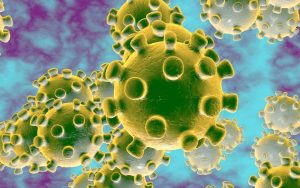
- clinic
- February 29, 2020
- 32346
CORONAVIRUS AND DYSAUTONOMIA: WHAT YOU NEED TO KNOW

Svetlana Blitshteyn, MD
With the spread of the coronavirus (COVID-19) throughout the world, including in the United States, patients with chronic illness may be concerned not only about COVID-19, but also how it can affect their pre-existing chronic illness. It’s understandable that patients with dysautonomia may become worried and anxious over catching the infection. In this article I will answer some of the common questions about COVID-19 to best of our knowledge.
1. Is COVID-19 like a bad flu?
COVID-19 a new virus that originated in Wuhan, China belonging to the family of coronaviruses. It appears to be more aggressive than the influenza virus and than other coronaviruses that usually cause mild upper respiratory illness, like the common cold.
2. How does COVID-19 spread?
The virus appears highly contagious and spreads from person to person through directly touching a contaminated surface and through inhaling respiratory droplets in the air when someone who is sick with COVID-19 coughs or sneezes in your proximity. It’s possible for the virus to survive on a surface outside of the body for up to 1 week. This is why decontaminating infected surfaces, washing hands and avoiding touching any part of one’s face with unwashed hands is important in preventing contamination and getting infected.
3. What can I do to prevent getting sick?
There is no treatment, and there is currently no vaccine for COVID-19 although a vaccine is being developed and may become available in about a year. The following prevention strategies are advised, according to the CDC:
Avoid close contact with people who are sick.
Avoid touching your eyes, nose, and mouth.
Stay home when you are sick.
Cover your cough or sneeze with a tissue, then throw the tissue in the trash.
Clean and disinfect frequently touched objects and surfaces using a regular household cleaning spray or wipe.
Wash your hands often with soap and water for at least 20 seconds, especially after going to the bathroom; before eating; and after blowing your nose, coughing, or sneezing.
If soap and water are not readily available, use an alcohol-based hand sanitizer with at least 60% alcohol. Always wash hands with soap and water if hands are visibly dirty.
4. Would wearing a mask protect me, and what kind of mask should I get?
The CDC does not recommend that people who are well wear a facemask to protect themselves from any respiratory illnesses, including COVID-19. You should only wear a mask if a healthcare professional recommends it. A facemask should be used by people who have COVID-19 and are showing symptoms. This is to protect others from the risk of getting infected. The use of facemasks also is crucial for health workers and other people who are taking care of someone infected with COVID-19 in close settings (at home or in a health care facility).
5. How would COVID-19 affect me if I have POTS or another form of dysautonomia?
We don’t know how COVID-19 affects people with autonomic or autoimmune disorders. We do know from preliminary research that age is a major factor in COVID-19 disease course and prognosis, with people over 80 years of age affected more severely than children and young adults who typically have a milder illness.
6. What should I do if I get sick and think it might be the coronavirus?
It’s cold and flu season, and if you have not been exposed to anyone sick with COVID-19 or if you have not traveled internationally to China, Japan, South Korea or Italy, your chances of catching COVID-19 are low at this time. As of March 2, 2020, there have been 43 cases of COVID-19 confirmed from 10 different states in the United States as reported by the CDC. Therefore, it is more likely that you are experiencing the flu or another viral illness, not COVID-19. If you’re running a high fever and having upper respiratory symptoms, such as runny nose, sore throat or cough, take Tylenol or Motrin and hydrate above the amount that you drink on a daily basis. See your primary care doctor and wear a mask at your doctor’s office to protect others from catching your infection.
7. How do I manage my worries about COVID-19?
Information coming in from major news channels and the social media can be certainly anxiety-provoking, but arming yourself with credible information from credible sources, like the CDC website, can help streamline the type of information that you need to know from the information that you don’t. Since stress is a major trigger for symptom worsening in any chronic illness, managing stress is very important and absolutely necessary to avoid a flareup of dysautonomia caused by stress. I encourage you to maintain your daily routine, drink fluids, eat healthy meals, and get exercise and plenty of sleep, but if you are experiencing a decline in function as a result of the excessive worry over the coronavirus, reach out to us for help! Our team is ready to help you cope with this new added stress in your life.
3 Comments
Well said thanks for the information
Thank you so much for this timely advice. I am happy to have found your website
This is starting to become outdated already. Anything new?
Comments are closed.